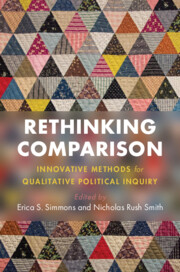Book contents
- Frontmatter
- Dedication
- Contents
- List of Figures
- List of Tables
- List of Contributors
- Acknowledgments
- 1 Rethinking Comparison: An Introduction
- Part I Rethinking the Building Blocks of Comparison
- 2 Beyond Mill: Why Cross-Case Qualitative Causal Inference Is Weak, and Why We Should Still Compare
- 3 Two Ways to Compare
- 4 Unbound Comparison
- 5 On Casing a Study versus Studying a Case
- 6 From Cases to Sites: Studying Global Processes in Comparative Politics
- Part II Developing New Approaches to Comparison through Research
- Theory and Imagination in Comparative Politics: An Interview with Lisa Wedeen
- Index
2 - Beyond Mill: Why Cross-Case Qualitative Causal Inference Is Weak, and Why We Should Still Compare
from Part I - Rethinking the Building Blocks of Comparison
Published online by Cambridge University Press: 24 September 2021
- Frontmatter
- Dedication
- Contents
- List of Figures
- List of Tables
- List of Contributors
- Acknowledgments
- 1 Rethinking Comparison: An Introduction
- Part I Rethinking the Building Blocks of Comparison
- 2 Beyond Mill: Why Cross-Case Qualitative Causal Inference Is Weak, and Why We Should Still Compare
- 3 Two Ways to Compare
- 4 Unbound Comparison
- 5 On Casing a Study versus Studying a Case
- 6 From Cases to Sites: Studying Global Processes in Comparative Politics
- Part II Developing New Approaches to Comparison through Research
- Theory and Imagination in Comparative Politics: An Interview with Lisa Wedeen
- Index
Summary
If case study comparison is useful in the social sciences, it should be at least as useful as a way of understanding the political preferences and participation of individuals as it is for larger and more complex social categories such as organizations, parties, militaries, or states. Thus, qualitative comparisons involving the political preferences and activity of American billionaires will serve as a benchmark for the plausibility of various comparative frameworks. The chapter will demonstrate that applying Mill’s method-type comparison to billionaires generates inferential absurdities and also shows that regression-type logics of control are a poor fit for individual-level qualitative analysis. More feasible frameworks for understanding qualitative comparison at the individual level come both earlier and later in the inferential process. Cross-case comparisons are highly valuable for concept formation and theory building prior to any systematic effort at causal inference and also play a meaningful role in inferences about moderation effects after process tracing has been successful within each case. Furthermore, multi-case qualitative analysis that is not structured as explicit comparison can make crucial contributions to multi-method research on individuals.
Keywords
- Type
- Chapter
- Information
- Rethinking ComparisonInnovative Methods for Qualitative Political Inquiry, pp. 31 - 46Publisher: Cambridge University PressPrint publication year: 2021
- 4
- Cited by

